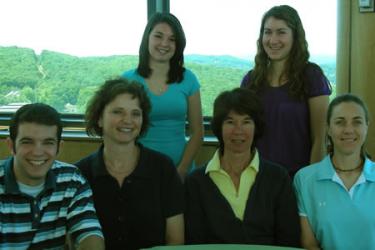
Project Description:
One of the major ways that cancer develops is through loss of genes encoding tumor suppressor proteins. One such tumor suppressor is p53, a protein mutated or absent in 50 – 60% of all human cancers. In a normal cell, p53 is part of a signal relay system which responds to DNA damaging agents or other stresses to halt cell proliferation allowing time for the cell to repair itself, or by activating apoptosis, an active cell death process carried out by the cell itself. Most chemotherapies act to ultimately activate apoptosis, but cells lacking p53 are resistant to apoptosis, making these cells difficult to destroy. We are examining a pathway that unexpectedly can lead to the apoptosis of cells lacking p53. Cells without p53 die when a protein called stathmin is also removed. Stathmin normally functions to regulate the assembly of the cell’s internal skeleton, so it isn’t clear why cancer cells lacking p53 require stathmin to stay alive, while normal cells are healthy without stathmin. This summer we will apply genomics methods to compare gene expression changes in cells having or lacking p53, and how these two cell populations respond to loss of stathmin. Our long term goal is to understand how stathmin contributes to cell survival or cell death. These studies could uncover new targets for chemotherapy development.
Our summer project is a collaborative effort between Lynne Cassimeris (Biological Sciences; studies stathmin), Ping-Shi Wu (Mathematics; studies statistical analysis of microarray/genomic data) and Jutta Marzillier (Biological Sciences; studies applications of microarray technology).
Project Year:
2008
Team Leaders:
Lynne Cassimeris, Ph.D.
Jutta Marzillier, Ph.D.
Ping-Shi Wu, Ph.D.
Graduate Students:
Bruce Carney
Danielle Ringhoff
Undergraduate Students:
Abigail Lefkowitz
Erica Smith





